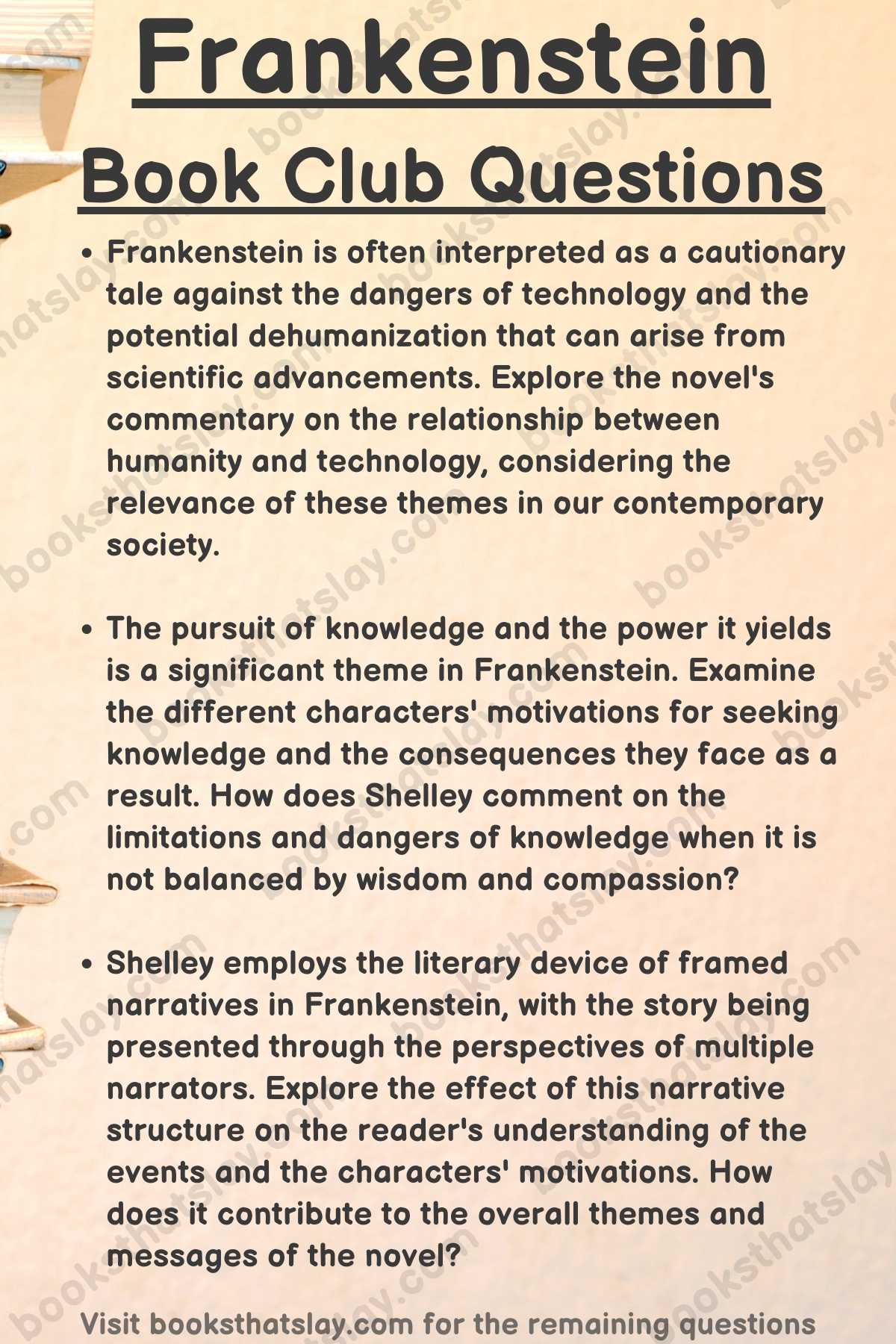15 Frankenstein Book Club Questions
Mary Shelley’s Frankenstein, a Gothic masterpiece birthed in 1818, continues to haunt and mesmerize readers centuries later.
This chilling tale of ambition, creation, and isolation delves into the darkest corners of the human psyche, exploring the profound consequences of unchecked scientific pursuit.
Often hailed as the progenitor of science fiction, the novel invites us to question the very nature of humanity, morality, and the boundaries between creator and created. Through its unforgettable characters and gripping narrative, Frankenstein offers a timeless cautionary tale that resonates with contemporary anxieties as much as it did with its 19th-century audience.
Join us as we dissect this literary titan, exploring its complex themes and characters through thought-provoking discussion questions.

Frankenstein Discussion Questions
- How does Mary Shelley utilize the character of Victor Frankenstein to explore the ethical and moral implications of scientific progress, and what does his ultimate fate suggest about the dangers of unchecked ambition and the pursuit of knowledge?
- In Frankenstein, Shelley presents a variety of contrasting female characters, including Elizabeth, Justine, and the creature’s unnamed mate. Discuss how these women are portrayed and the significance of their roles in the novel. How do they challenge or reinforce traditional gender roles of the time?
- The creature in Frankenstein grapples with a profound sense of isolation and rejection. Analyze the themes of loneliness and alienation as they are developed throughout the novel, examining the impact of these experiences on both the creature and Victor Frankenstein.
- Shelley employs the literary device of framed narratives in Frankenstein, with the story being presented through the perspectives of multiple narrators. Explore the effect of this narrative structure on the reader’s understanding of the events and the characters’ motivations. How does it contribute to the overall themes and messages of the novel?
- Frankenstein delves into the concept of playing God by exploring the creation of life through scientific means. Consider the moral and philosophical implications of this theme, including the responsibility of creators for their creations and the potential consequences of interfering with the natural order of life.
- Nature is a recurring motif in Frankenstein, often serving as a source of solace and reflection for the characters. Analyze the role of the natural world in the novel, discussing how it reflects and contrasts with the artificiality and scientific pursuits depicted throughout the story.
- The notion of monstrosity is central to Frankenstein, not only in the physical appearance of the creature but also in the actions of human characters. Discuss the various forms of monstrosity presented in the novel, exploring how they relate to societal prejudices, the fear of the “Other,” and the capacity for both good and evil within individuals.
- The pursuit of knowledge and the power it yields is a significant theme in Frankenstein. Examine the different characters’ motivations for seeking knowledge and the consequences they face as a result. How does Shelley comment on the limitations and dangers of knowledge when it is not balanced by wisdom and compassion?
- Frankenstein is often interpreted as a cautionary tale against the dangers of technology and the potential dehumanization that can arise from scientific advancements. Explore the novel’s commentary on the relationship between humanity and technology, considering the relevance of these themes in our contemporary society.
- Discuss the role of parental figures in Frankenstein, focusing on the relationships between Victor and his parents, as well as the creature’s yearning for a parental figure. How do these relationships shape the characters’ identities and actions, and how do they reflect the broader themes of responsibility and accountability?
- The pursuit of revenge is a driving force for both Victor Frankenstein and the creature in Frankenstein. Analyze the motivations and consequences of their respective quests for vengeance, examining how they are influenced by their experiences of abandonment, injustice, and the desire for retribution.
- Frankenstein explores the concept of human empathy and the consequences of its absence. Examine the parallels between the creature’s search for understanding and acceptance and the human characters’ lack of empathy toward him. What does the novel suggest about the significance of empathy in fostering meaningful connections and promoting compassion within society?
- Throughout the novel, Shelley engages with the idea of the sublime, presenting scenes of overwhelming natural beauty alongside moments of terror and horror. Discuss how the sublime is utilized in Frankenstein to elicit emotional and psychological responses from the reader and how it contributes to the novel’s exploration of human experience and the unknown.
- The novel’s setting plays a significant role in shaping the events and atmosphere of Frankenstein. Analyze the importance of specific settings, such as the Swiss Alps, Ingolstadt, and various domestic spaces, in relation to the themes and character development in the novel. How do these settings enhance the overall narrative and contribute to the reader’s understanding of the story?
- Consider the implications of the novel’s subtitle, “The Modern Prometheus,” in relation to the story of Frankenstein. Analyze the parallels between Victor Frankenstein and the mythological figure Prometheus, exploring the themes of creation, rebellion, punishment, and the pursuit of knowledge.
What broader messages does Shelley convey through this allusion?
If you liked this set of questions, here are a few other options for you to explore.